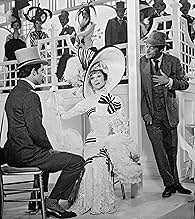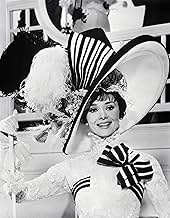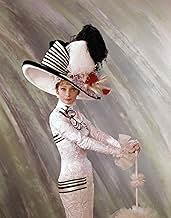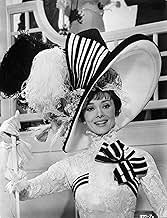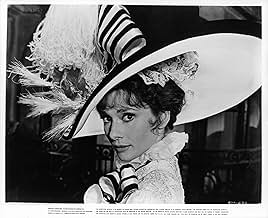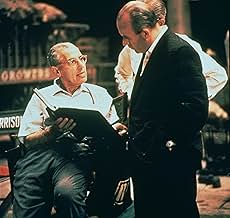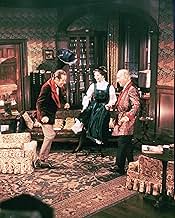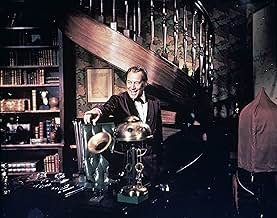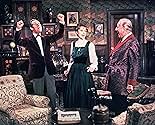Um professor de fonética aceita a aposta de que ele pode transformar uma garota para ela ter sucesso na alta sociedade.Um professor de fonética aceita a aposta de que ele pode transformar uma garota para ela ter sucesso na alta sociedade.Um professor de fonética aceita a aposta de que ele pode transformar uma garota para ela ter sucesso na alta sociedade.
- Direção
- Roteiristas
- Artistas
- Ganhou 8 Oscars
- 26 vitórias e 13 indicações no total
David Ahdar
- Ball Guest
- (não creditado)
- …
Elizabeth Aimers
- Cockney
- (não creditado)
Helen Albrecht
- Ascot Extra
- (não creditado)
John Alderson
- Jamie - Doolittle's crony
- (não creditado)
Mary Alexander
- Cockney
- (não creditado)
Gertrude Astor
- Cockney
- (não creditado)
LaWana Backer
- Ad Lib at Church
- (não creditado)
Walter Bacon
- Ball Guest
- (não creditado)
Avaliações em destaque
10Hitchcoc
I don't know how much I can add to this. The musical stands alone, as far as I'm concerned, so it puts a lot of pressure on the director, George Cukor, one of the greatest, to complement it. This is a lot to ask. I love this movie. I never got a chance to see the Broadway cast (I was four when it opened), but I have never been disappointed. The production numbers are grand, the byplay between the smug, offensive Higgins and Eliza is precious (my favorite song is "Just You Wait, Henry Higgins"). I've always been intrigued how Freddy never even has a chance (I can't watch those wonderful Sherlock Holmes episodes without imagining the grim visage of Jeremy Brett singing "On the Street Where You Live."). The one thing that made an impression on me, though some may see it as a criticism, is how "clean" everything is. There is no doubt in my mind that Cukor was elevating not only the dialogue but the visual images. It's probably not fair to like a movie because you like looking at an actress, but Audrey Hepburn glows in her Eliza, and I don't care if she is or was a street girl, she is the magical rose on the landscape before she ever meets Higgins. The business about who sings the songs is of no significance to me. This is a movie, not the Broadway show, so the images and sounds are melded and presented. Knowing that Audrey Hepburn has a beautiful voice makes it moot as well. I don't know if she could carry the picture or not--maybe not, but it doesn't concern me. When I first saw Stanley Holloway, there was something about him that grated on me (too many performances on the Ed Sullivan Show). He grated on me as Eliza's father. Now, every time I see this film, I thoroughly enjoy him and I really like the comedic qualities of his song. I love how he and his cronies cavort around London with total disregard for their base roots. I could go on, but I really like this film because it is filled with class: George Bernard Shaw filtered through George Cukor. Not bad!
There's a lot of negative things been said about Audrey Hepburn's interpretation of the role of Eliza. Perhaps she's not ideal in the earliest scenes of the movie - her "dirtiness" is never quite believable - but it has to be said that despite this smallish drawback she still glows, and makes an amazing Eliza overall.
The reason for this is simple; Audrey Hepburn brings her "own spark of divine fire", (to quote Higgins) to the role and her vulnerability, mixed with her sweet, naive charm and even her wonderfully juvenile pettishness shown in "Just You Wait" all prove what a talented actress she really is. For an example of this, just watch Eliza's facial expression at Ascot, when she realises her opportunity to demonstrate her new-found mastery of the English tongue - sweetly hilarious.
MFL has been criticized as being too romanticized, too overblown. I disagree; musicals are suposed to be lavish affairs, and none pull it off quite so well as "My Fair Lady" does. It's a momentous film but it has its subtle points: watch the way in which Eliza's eyes are centred on Higgins when she enters at the ball, and the way in which the two of them stare at each other for a few seconds at the top of the stairs a few moments later.
It musn't be overlooked that, thanks to its being based on a Bernard Shaw play, "My Fair Lady" has what the great majority of musicals lack: a deeper meaning and something really quite profound to say.
The actor in the role of Colonel Pickering is a little weak, but it must be said that Rex Harrison IS Henry Higgins. In a lot of ways (in fact, in most ways) Higgins has an objectionable personality: rude, snobbish, impatient and even misogynistic, but somehow Rex Harrison pulls it all off and makes us like Higgins without betraying the character. As to romance, his song "I've Grown Accustomed to Her Face" is an ode to the kind of love which sneaks up on you. Overall, this movie is romantic, but not too sentimental. It has just enough romance to be dramatically fulfilling, but it never becomes soppy or mawkish. The word "love" is never mentioned at all and the two leads never even kiss. The famous end sequence is perfect and does the movie justice; after all, a big happy bow tied around a perfect romance at the end would simply not fit with everything we have learned about the two protagonists.
The reason for this is simple; Audrey Hepburn brings her "own spark of divine fire", (to quote Higgins) to the role and her vulnerability, mixed with her sweet, naive charm and even her wonderfully juvenile pettishness shown in "Just You Wait" all prove what a talented actress she really is. For an example of this, just watch Eliza's facial expression at Ascot, when she realises her opportunity to demonstrate her new-found mastery of the English tongue - sweetly hilarious.
MFL has been criticized as being too romanticized, too overblown. I disagree; musicals are suposed to be lavish affairs, and none pull it off quite so well as "My Fair Lady" does. It's a momentous film but it has its subtle points: watch the way in which Eliza's eyes are centred on Higgins when she enters at the ball, and the way in which the two of them stare at each other for a few seconds at the top of the stairs a few moments later.
It musn't be overlooked that, thanks to its being based on a Bernard Shaw play, "My Fair Lady" has what the great majority of musicals lack: a deeper meaning and something really quite profound to say.
The actor in the role of Colonel Pickering is a little weak, but it must be said that Rex Harrison IS Henry Higgins. In a lot of ways (in fact, in most ways) Higgins has an objectionable personality: rude, snobbish, impatient and even misogynistic, but somehow Rex Harrison pulls it all off and makes us like Higgins without betraying the character. As to romance, his song "I've Grown Accustomed to Her Face" is an ode to the kind of love which sneaks up on you. Overall, this movie is romantic, but not too sentimental. It has just enough romance to be dramatically fulfilling, but it never becomes soppy or mawkish. The word "love" is never mentioned at all and the two leads never even kiss. The famous end sequence is perfect and does the movie justice; after all, a big happy bow tied around a perfect romance at the end would simply not fit with everything we have learned about the two protagonists.
... that being the late 50s to the late 60s. They don't particularly age well .Looking back on them in the context of the 1960s they seem downright anachronistic. . At least this film is not offensive. Gigi, which won Best Picture of 1958, has a young woman's relatives trying to turn her into a prostitute, from which she wisely figures out there is no coming back, while Maurice Chevalier musically ogles little girls from the shelter of the bushes. That one didn't age well in a bunch of ways.
This one has fabulous music, magnificent art design, quite a bit of great dry humor, and perfect casting - except I really wish James Cagney had taken the part of Eliza's father. It would have made a great bookend for his film career. The direction is perfectly on target for late career George Cukor. He won Best Director Oscar for this and didn't make another film for five years.
Rex Harrison certainly deserved his Best Actor Oscar as misanthropic phoneticist Henry Higgins. He is both stern and humorous, his vocals in both song and word are alive and nothing less than perfect. Also, Wilfrid Hyde-White as Pickering adds a great deal to the film, and I appreciate him more on successive viewings.
Thus it is hard to give a film with such great production values less than a 7/10. I have a couple of problems with it. First, it is just too long. Clocking in at two hours and fifty minutes, there is just too much movie for too little story. Pygmalian, starring Leslie Howard, was perfect at ninety minutes, and I actually prefer that film to this one. Second, I don't like the resolution because there isn't one. After all of that squabbling at Higgins' mother's house, after Higgins realizing he has "grown accustomed to her face", the end is just a let down. Had it gone on any longer it would have become Season Four of Moonlighting.
This one has fabulous music, magnificent art design, quite a bit of great dry humor, and perfect casting - except I really wish James Cagney had taken the part of Eliza's father. It would have made a great bookend for his film career. The direction is perfectly on target for late career George Cukor. He won Best Director Oscar for this and didn't make another film for five years.
Rex Harrison certainly deserved his Best Actor Oscar as misanthropic phoneticist Henry Higgins. He is both stern and humorous, his vocals in both song and word are alive and nothing less than perfect. Also, Wilfrid Hyde-White as Pickering adds a great deal to the film, and I appreciate him more on successive viewings.
Thus it is hard to give a film with such great production values less than a 7/10. I have a couple of problems with it. First, it is just too long. Clocking in at two hours and fifty minutes, there is just too much movie for too little story. Pygmalian, starring Leslie Howard, was perfect at ninety minutes, and I actually prefer that film to this one. Second, I don't like the resolution because there isn't one. After all of that squabbling at Higgins' mother's house, after Higgins realizing he has "grown accustomed to her face", the end is just a let down. Had it gone on any longer it would have become Season Four of Moonlighting.
I first saw this film when I was eight years old, after receiving it as a first communion present from my mother. For months I watched the movie on an almost daily basis, and it was quickly a favorite. I thought it was absolute perfection.
Now that I am a bit older.. I notice that is does have quite a few flaws. It doesn't really capture the essence of Shaw's Pygmalion, but I don't think that should really take away from the movie; they should be treated as separate entities. Some of the sets are a little, well, cramped, but consider what they had to work with, they did a pretty good job.
And then there is the dubbing issue. I recently special on MFL on AMC, and they showed "Wouldn't It Be Loverly" and "Show Me" with Audrey's voice, and though Audrey may not have the perfect melodic voice of Marni Nixon, her voice was much more "Eliza". I really do think they should have just used her voice. If you watch "Funny Face", you get a good feel for voice, which I think is beautiful in a unconventional way.
Then, there is the question of whether Julie Andrews should have played Eliza in the film version of MFL. I've gone back and forth on this issue. Now, Audrey Hepburn is my favorite actress of all time, and Julie Andrews is a close runner-up, so it really is hard to "choose". Of course Julie's voice is much better than even Marni Nixon's... but like I said before, I don't think a perfect singing voice really would suit Eliza. And as for which would play a better Eliza overall.. I really don't know. I wasn't alive to see MFL on Broadway, so I really can't compare the two. What I do know is that Audrey gave an amazing performance. Anyway, as someone else said, if Julie had played Eliza, who would have played Mary Poppins? ;)
Now that I am a bit older.. I notice that is does have quite a few flaws. It doesn't really capture the essence of Shaw's Pygmalion, but I don't think that should really take away from the movie; they should be treated as separate entities. Some of the sets are a little, well, cramped, but consider what they had to work with, they did a pretty good job.
And then there is the dubbing issue. I recently special on MFL on AMC, and they showed "Wouldn't It Be Loverly" and "Show Me" with Audrey's voice, and though Audrey may not have the perfect melodic voice of Marni Nixon, her voice was much more "Eliza". I really do think they should have just used her voice. If you watch "Funny Face", you get a good feel for voice, which I think is beautiful in a unconventional way.
Then, there is the question of whether Julie Andrews should have played Eliza in the film version of MFL. I've gone back and forth on this issue. Now, Audrey Hepburn is my favorite actress of all time, and Julie Andrews is a close runner-up, so it really is hard to "choose". Of course Julie's voice is much better than even Marni Nixon's... but like I said before, I don't think a perfect singing voice really would suit Eliza. And as for which would play a better Eliza overall.. I really don't know. I wasn't alive to see MFL on Broadway, so I really can't compare the two. What I do know is that Audrey gave an amazing performance. Anyway, as someone else said, if Julie had played Eliza, who would have played Mary Poppins? ;)
My Fair Lady is a musical which is very witty. The dialogue is wonderful. The story begins as Henry Higgins (Rex Harrison) makes a bet that he can transform flower girl Eliza Dolittle (Audrey Hepburn) into a high society lady. Henry Higgins is the perfect example of high society snobbery of the times. What he wasn't counting on was falling in love with his "project". Some people may find this film to be sexist but it is really quite the opposite. While it is about a sexist person it is not actually sexist at all. In fact it is all about the irony in the relationship between that of Eliza Dolittle and Henry Higgins. It is not unbelievable that Henry and Eliza should fall in love because they are not "compatible". Opposites often attract after all. Even though there is an anti-romantic disclaimer in the original play Pygmalion , it is obvious that Eliza and Higgins are meant for one another in the end of My Fair Lady. My Fair Lady is really different from Pygmalion. There is a movie version of Pygmalion which is the dull non-musical version of My Fair Lady. Rex Harrison is simply wonderful as Henry Higgins. He is not one bit tired with his role. And even though Julie Andrews originated the role of Eliza on Broadway, Audrey Hepburn is great in the role. It would be unfair to say that she didn't deserve the role just because her voice was dubbed. The supporting cast is first rate as well. This film is more than just good, it is great. If you have not seen it yet you certainly should!
*****/ ***** stars
*****/ ***** stars
Oscars Best Picture Winners, Ranked
Oscars Best Picture Winners, Ranked
See the complete list of Oscars Best Picture winners, ranked by IMDb ratings.
Você sabia?
- CuriosidadesCostume designer Cecil Beaton created 1,500 costumes for this movie, with the exception of the pearl white gown Hepburn wears to the Embassy Ball, an original Edwardian specimen Beaton found in an antique shop.
- Erros de gravaçãoWhen Prof. Higgins sings "An Ordinary Man" he turns on several phonographs, seconds later he turns off one of them but all of the sounds stop.
- Citações
Professor Henry Higgins: There even are places where English completely disappears; in America they haven't used it for years.
- Cenas durante ou pós-créditosIn the posters, playbills and the original cast album for the stage version of "My Fair Lady", the credits always read "based on Bernard Shaw's 'Pygmalion' ", letting the audience know what play "My Fair Lady" was actually adapted from. The movie credits simply read "from a play by Bernard Shaw".
- Versões alternativasIn the remastered version of the film, some of the scene changes are changed from sudden cuts to wipe outs, as they probably were when the film was released. When CBS Fox released it on video originally, they were changed to sudden cuts.
- ConexõesFeatured in Toast of the Town: Episode #18.17 (1965)
- Trilhas sonorasWhy Can't the English?
(1956) (uncredited)
Music by Frederick Loewe
Lyrics by Alan Jay Lerner
Performed by Rex Harrison, Wilfrid Hyde-White, and Audrey Hepburn
Principais escolhas
Faça login para avaliar e ver a lista de recomendações personalizadas
Detalhes
- Data de lançamento
- País de origem
- Central de atendimento oficial
- Idioma
- Também conhecido como
- Minha Querida Dama
- Locações de filme
- Stage 16, Warner Brothers Burbank Studios - 4000 Warner Boulevard, Burbank, Califórnia, EUA(Ascot & Ballroom scenes)
- Empresa de produção
- Consulte mais créditos da empresa na IMDbPro
Bilheteria
- Orçamento
- US$ 17.000.000 (estimativa)
- Faturamento bruto nos EUA e Canadá
- US$ 72.560.711
- Fim de semana de estreia nos EUA e Canadá
- US$ 354.764
- 17 de fev. de 2019
- Faturamento bruto mundial
- US$ 72.685.970
- Tempo de duração
- 2 h 50 min(170 min)
- Cor
- Mixagem de som
- Proporção
- 2.20 : 1
Contribua para esta página
Sugerir uma alteração ou adicionar conteúdo ausente







